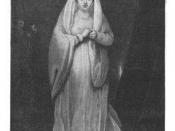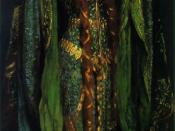Is Lady Macbeth More Ruthless? Everyone in life have their own desires and work to fulfill their goals. In Shakespeare's Macbeth, Macbeth and Lady Macbeth, had the goal to becoming king and queen. To obtain their goal they took matters into their own hands and killed the present king, Duncan. For someone to commit such an act as murder to fill their desires, the conspirators must be ruthless. In the relationship, many would say that Lady Macbeth was more ruthless than her husband, and it was her ruthlessness that fueled Duncan's murder.
From the start of the play, Macbeth desires to become king after he hears what the witches said about his fate. "Present fears are less than horrible imaginings. My thought, whose murder is yet but fantastical, shakes so that my single state of man that function is smoldered. I surmise and nothing is but what is not."ÃÂ(Shakespeare
1:3:137-139) Macbeth knows that Duncan must be killed if he wants to acquire the crown, and the thought of Duncan's murder is very disturbing to him. Macbeth realizes that he must act fast when Malcolm is chosen to become Prince of Cumberland. The reader can see the ruthlessness in Macbeth when he says, "The Prince of Cumberland- that is a step on which I must fall down or else o'erleap, for in my ways it lies."à(Shakespeare 1:4:48-50) Despite the fact that Macbeth is a ruthless individual, Lady Macbeth is far more barbarous than he is. After she reads the letter from her husband, she sees an opportunity to become queen. It is clear to the reader that her desire for Macbeth to become king is stronger that Macbeth's own desire. After she hears that Duncan is going to visit the town, she begins plotting the murder even though Macbeth shows hesitation. Macbeth shows that he does not want to commit an act of murder when he says, "Art not without ambition, but without the illness should attend it."ÃÂ(Shakespeare 1:5:20-21 Lady Macbeth's ruthlessness is displayed when she asks, "Come, you spirits that tend on mortal thoughts, unsex me here, and fill me from the crown to the toe top-full of dirtiest cruelty"æ."ÃÂ(Shakespeare 1:5:20-21) She calls upon the spirits to help her find the power to kill Duncan since she can't, but she was the potential to do it herself if she was a male. When Malcolm arrives at the town, it's Lady Macbeth that starts to talk about the plot to kill the king, "Your hand, your tongue; look like th' innocent flower, but be the serpent under't."à(Shakespeare 1:5:66-68) She urges Macbeth to kill Duncan because she knows he is not as hard-hearted as her.
Perhaps the most significant events that display that Lady Macbeth is more ruthless than her husband occurs in scene seven of act one. "First, as I am his kinsman and his subject, Strong both against the deed; then, as his host, who should against his murdered shut the door, not bear the knife myself."ÃÂ (Shakespeare 1:7:13-16) Macbeth in this scene shows that he wants to become king, but does not want to kill to achieve this goal. In Macbeth's soliloquy he judges all the pros and cons of murdering Duncan, and for a short period, decides not to kill when he tells his wife, "We will proceed no further in this business."ÃÂ (Shakespeare 1:7:31) Lady Macbeth scolds him on his decision and changes his mind by saying, "What beast was't then that made you break this enterprise to me?"ÃÂ (Shakespeare 1:7:48) Lady Macbeth lowers her husband's self-worth and says that he owes it to her to kill Duncan. She tells him that he doesn't love her if he can't kill Duncan. After they both decide to commit this deadly act, it's Lady Macbeth who sets up a plan to help them attain their goal. This provides further support that although Macbeth is ruthless; Lady Macbeth exceeds him in quality.
After Duncan is murdered, there is only one conspirator that feels any remorse. "Still it cried "ÃÂSleep no more!' to all the house; "ÃÂGlamis hath murdered sleep, and therefore Cawdor shall sleep no more, Macbeth shall sleep no more.'"ÃÂ (Shakespeare 2:2:42-45) Instead of comforting her husband she criticized him for being softhearted. "How easy is it then! Your constancy hath left you unattended."ÃÂ (Shakespeare 2:2:67-68) in this quote Lady Macbeth indicates her satisfaction of the murder. Any sane person would not act in such a manner that she displays, and is relevant that she is more ruthless than Macbeth.
Everyone in life has their own ways to achieve their goals they set forth for themselves. In Shakespeare's Macbeth, Lady Macbeth used her softhearted, ruthless husband to achieve her goal of becoming queen. Macbeth also had the goal of becoming king, but did not want the royalty as much as his wife. If it wasn't for the fast that Lady Macbeth is more ruthless that her husband, their desires would not have been fulfilled.





